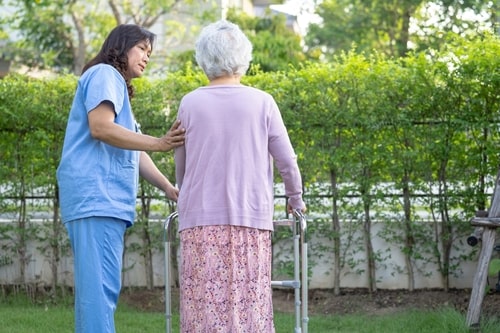
Nursing home elopement is a serious issue that can put vulnerable residents at significant risk. If you have a loved one in a nursing home, understanding what elopement is and how it can be prevented is crucial. If your loved one was already injured in a situation involving elopement and you are seeking legal guidance, a trusted attorney can help you through this difficult situation.
What Does Nursing Home Elopement Mean?
Nursing home elopement occurs when a resident leaves the facility without staff knowledge or permission. This can be particularly dangerous for residents with cognitive impairments, such as dementia or Alzheimer’s disease, as such conditions can make residents confused and unable to find their way back to the facility. Elopement can lead to serious injury or death if the resident is not found and returned quickly.
Why Does Elopement Happen?
There are several reasons why nursing home elopement might occur:
- Cognitive impairment – Residents with conditions like dementia can become confused and wander off.
- Emotional distress – Feelings of anxiety, depression, or loneliness can spur a resident to leave the facility.
- Lack of supervision – Insufficient staffing or inattentive caregivers can result in residents leaving unnoticed.
- Desire for independence – Some residents may feel a strong urge to regain their freedom and leave on their own.
Understanding these triggers can help in finding ways to prevent elopement.
The Dangers of Nursing Home Elopement
When a resident elopes, several risks are involved:
- Physical harm – Wandering off can lead to accidents like falls, traffic incidents, or exposure to harsh weather conditions.
- Medical emergencies – Residents may miss important medications or medical treatments, worsening their health.
- Emotional trauma – Elopement can cause significant distress and anxiety for both the resident and the resident’s family.
These dangers highlight the critical need for proper monitoring and care in nursing homes.
How to Prevent Nursing Home Elopement
Preventing elopement requires a combined effort from both family members and nursing home staff. Here are some strategies:
- Regular assessments – Conduct regular assessments to identify residents at risk of elopement.
- Staff training – Ensure all staff members are trained to recognize and manage potential elopement behaviors.
- Security measures – Install alarms, locks, and surveillance systems to monitor exits and entrances.
- Personalized care plans – Develop individual care plans that address each resident’s specific needs and triggers.
Contact Our Peoria, IL Nursing Home Elopement Attorney
Nursing home elopement is a pressing issue that requires attention and action from both families and nursing home staff. If your loved one was involved in an incident involving nursing home elopement, it is crucial to obtain legal representation. Contact the Peoria County, IL nursing home elopement lawyers with Nursing Home Injury Center. Call 309-524-6900 for a free consultation.



